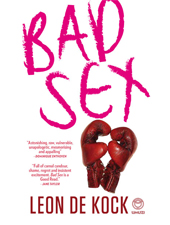Bad Sex. Bibi Slippers interviews Leon de Kock, 5 March 2012, US Woordfees, Stellenbosch
CARYN JEFTHA

NOTE: Go to bottom for an audio podcast of this event.
It is 10:50am and I am precariously seated in the small hall at Erfurthuis, anticipating the arrival of Leon de Kock. A quick look around the venue reveals that I am the youngest spectator here, the crowd consisting predominantly of elderly Afrikaans speaking individuals. My anticipation is heightened as I wonder to myself whether or not these onlookers have actually read Bad Sex; whether they are prepared to sit through 50mins of De Kock discussing the raw content of his book, whether they can handle the content. Now I am eager to see this interview unfold; devilishly hoping for a spectacular display of outrage and disgust by my fellow spectators so that I may revel in an awkward atmosphere. One minute more before the interview is scheduled to start and in walks De Kock. The proverbial elephant has entered the room, much to my delight.
The interview begins with De Kock reading a passage from the chapter "Apprenticeship". It's one of the milder scenes in the novel, but I’m hoping it will elicit some sort of response. Much to my surprise, the crowd is tickled pink by De Kock's reading; he is received with delighted laughter and even heckled in appreciation. Well, I was not expecting that response. Nevertheless, I find myself quite enjoying this responsive crowd, and couldn't help but note that the festal ethos that Woordfees inspires has spilled into this cozy little room.
Straight off the bat, De Kock's interviewer, Bibi Slippers, calls him out as a "shit-stirrer". De Kock laughs. The crowd laughs. I'm still wallowing in disappointment at this lovely reception. Nevertheless, De Kock goes on to explain that Bad Sex is not only about "stirring shit", it was initially meant to be an unapologetic defence of masculinity but resulted in an acute illustration of the crisis of masculinity. His animating impulse in writing this novel was based on the notion that men are “over-spoken”; that within the "sex wars" between men and women, the other side is always being re-narrativised. Whereas men objectify women, women narrativise men. I find this to be an interesting speculation, which, prompted by Slippers, is further described through the choice of the novel’s cover. She describes the scrawled font of the title “Bad Sex” as “slutty, smutty lipstick” that alludes to the protagonist’s view of women as being powerful vixens. Indeed, the women in this novel are portrayed as such; they are sexy, enticing and provocative, and the book’s cover hints at another level within the “sex wars”: that women might just be the “bad” sex. For De Kock, the cover was carefully arranged to capture the proximity of love and loathing, the “mutually repressed loathing just beneath the surface of all relationships”. The boxing gloves, arranged in the shape of a heart, exemplify this notion of the genders being at war.
At this point the interview has gotten incredibly interesting, the crowd is hanging on De Kock’s every word; myself included. The interviewer now raises the topic of sex as a theme, and his writing of these scenes. Anyone who has read the novel will agree to the fact that De Kock’s sex scenes are incredibly graphic; there is something both unnerving and enthralling when reading it, one’s body cannot help but respond to it – a sexualised body engaging with a sexualised text. De Kock goes on to say: “What is sex except the stories we tell (one another) about it, more than the mere physical chafing it is, the mythology weaved into the narratives.”
Bad Sex is not about the actual, physical activity, but about these stories. The author aims to cover the gap in this narrative weaved out of myths and to relay the nitty-gritty of what actually happens. Sammy, the protagonist, is the mouthpiece for these untold narratives of sex, specifically within the South African context, where patriarchies have been particularly disgraceful. Bad Sex plays on the post-feminist moments of the past 30-40 years, and De Kock provides a platform for “even a white man”, whom he describes as being “the most redundant category in South African society”.
The interview is drawing to a close and one final question is posed to De Kock: what is he currently working on? Not surprisingly, he doesn’t divulge too much information, but does mention that the public’s response to Sammy was warm and that they’d like to see him return. Here De Kock describes his relief in having his female readers welcome the character of Sammy, as one of his biggest fears in publishing Bad Sex was that it would offend women. Personally, I was often torn between sympathising and loathing Sammy. However, I cannot deny that the struggle he articulates within the gender wars is a universal one – a symbolic war that transcends time, to which every individual is part and parcel. Sex is just one of the weapons both men and women yield in the gender wars. Bad Sex, then, can be viewed as a mini “win” for the masculine side.
 SLiPStellenbosch Literary Project
SLiPStellenbosch Literary Project
How old is ‘elderly’? Quite surprised that Slip would publish an ageist writer responding to a discussion. What does Jeftha think, when you’re elderly you don’t have sex? Or you don’t read? Come on, less of Caryn Jeftha’s self-announced presence in the discussion and more of the content of what was actually discussed please.